
Born in Cerea (VR) in 1953 and based in Fumane, Roberto Ferrarini was the holder of numerous titles. He authored over 150 national and international works, publications and communications – scientific, technical and informative in nature. He was Director of Research and Director of the departments of Development and University Research, as well as the scientist responsible for various research projects financed by the Veneto region. As a professor on the viticultural and oenological sciences course at the University of Verona, Roberto Ferrarini was also a member of the Italian Academy of Vine and Wine and a member of the Italian OIV delegation on behalf of the Ministry of Agriculture, notably as part of the "Oenology" Commission and the "Technology" Expert Group.
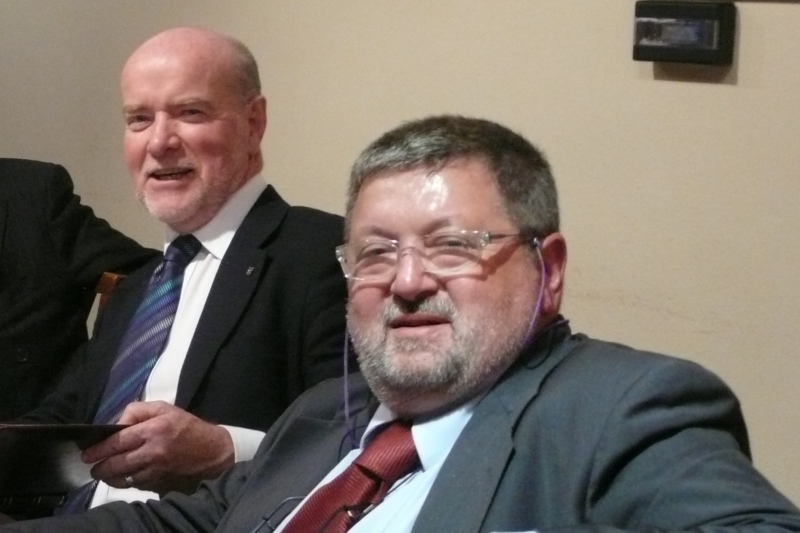
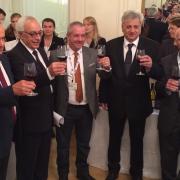
This presentation follows the OIV Director General's visit in September to present, to professionals in the sector, the technical and scientific activities of the OIV, as well as to strengthen cooperation of expertise. The Director General of the Israeli Ministry of Agriculture, Mr Ramy Cohen, was delighted that, for the second time at the OIV headquarters, Israeli viticulture had the opportunity to become better known as one of the components of Mediterranean wine culture.
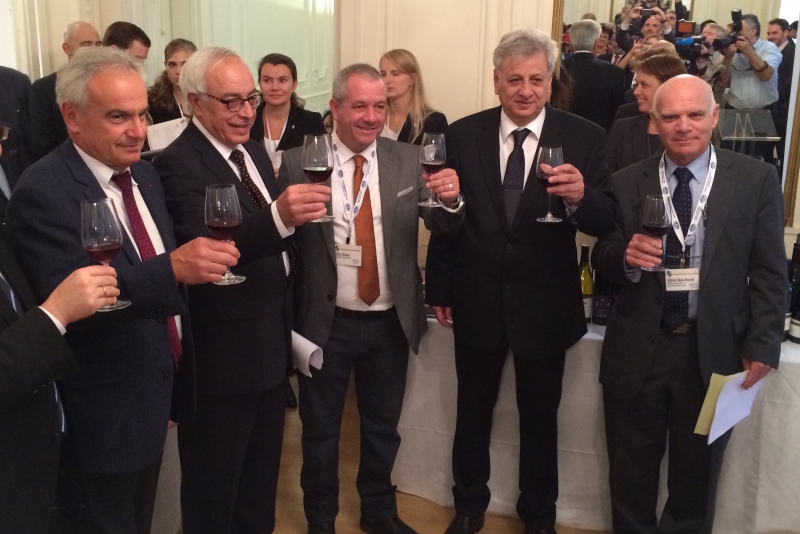
From left to right:
Jean-Marie Aurand, OIV Director General - Yossi Gal, Israeli Ambassador in France - Zahi Dotan, Director General of the Israel Wine Grapes Board - Ramy Cohen, Director General,
Ministry of Agriculture - Itzik Ben David, Deputy Director General for Foreign Trade, Ministry of Agriculture

Created in 2009 at the initiative of the French Ministry of Higher Education and Research, and uniting numerous professionals from universities and research organisations, the BSN ensures that any teacher-researcher, researcher or student has relevant scientific information and the most efficient tools possible available to them. The aim of this call for projects was to increase visibility and open-access dissemination in a digital environment of document corpora of major benefit to research.
In collaboration with the OIV, this project was supported by the University of Bourgogne and the National Center for Scientific Research acting on behalf of the French research institution, the Maison des Sciences de l'Homme (MSH) de Dijon, which has an Archives-Literature-Digitisation (Archives-Documentation-Numérisation, ADN) platform that is one of only a few in France to provide an data processing chain in its totality.
Attended by Mr Francis Aubert, Director of the MSH de Dijon, and Mr Yann Juban, Assistant to the Director General of the OIV, the first steering committee met in Dijon in order for the project's partners and service providers to discuss the different steps that should enable the collection to be made available online in 18 months' time, in June 2016. The technical phase of digitisation is already underway, with nearly 30% of texts processed. Discussions will be ongoing regarding tools for indexation and cataloguing, in order "to provide an interdisciplinary research tool for the use of the scientific community as well as professionals in the vine and wine sector or the general public ", as described by Professor Laurent Gautier, who took charge of the project.
This partnership supplements the new policy of digital scientific publication implemented by the OIV, which was presented by the Director General of the Organisation at the OIV General Assembly. The scientific publications presented at the Congress are now available on an OPEN ACCESS basis on the website http://oiv.edpsciences.org/ and in the Bio Web of Conferences journal. Mr Jean-Marie Aurand, indicating that this was the equivalent in volume of five years of the Bulletin, expressed his satisfaction that "these coordinated actions of the OIV can guarantee the sustainability and universality of access to international scientific and technical information in the vitivinicultural field."
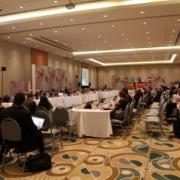
Decisions on Oenological Practices
Several resolutions relating to new oenological practices will be added to the International Code of Oenological Practices of the OIV, in particular:
- A new oenological practice on the treatment of wines using a membrane technique coupled with activated carbon to reduce excess 4-ethylphenol and 4-ethylguaiacol was accepted (Resolution OIV-OENO 504-2014). This physical treatment consists of using technologies combining nanofiltration and treatment with deodorising activated carbon, with the objective of reducing the content of 4-ethylphenol and 4-ethylguaiacol of microbial origin, which constitutes an organoleptic defect and masks the aromas of the wine.
- In addition, a Code of good vitivinicultural practices in order to avoid or limit contamination by Brettanomyces was adopted (Resolution OIV-OENO 462-2014). Among processes that deteriorate wine quality, the production of volatile phenols by Brettanomyces is widespread and increasingly problematic. The management of Brettanomyces is an important winemaking issue; Brettanomyces are reported to be involved in spoilage resulting in aromatic defects. This code determines the measures to be set up in vineyards and in wine cellars in order to contribute to reducing the risks linked to the presence of Brettanomyces.
Decisions on Specifications of Oenological Products
The following monographs have been added to the International Oenological Codex, in particular:
- A monograph on PVI/PVP adsorbent copolymers. Various detailed specifications accompany this monograph, monomer limits in musts and wines in particular. This monograph thus supplements the oenological practice that permits the treatment of wines with this copolymer. (Resolution OIV-OENO 262-2014).
- A monograph on silver chloride (Resolution OIV-OENO 505-2014). This monograph relates to silver chloride used for adsorption by an inert support with a view to its use in wine. Silver chloride is used for the treatment of wines to remove fermentation- and storage-related abnormal odours (odours caused by reduction reactions, characterised by the presence of hydrogen sulphide and thiols).
Decisions on Methods of Analysis
During this same session, three new methods of analysis were adopted and will be added to the analytical corpus of the OIV. These include, in particular:
- A method of determination of biogenic amines in wine by high-performance liquid chromatography with photodiode array detection (Resolution OIV-OENO 457-2014). The principle of this method is based on the coupling of a chromophore to the biogenic amines, which, by derivatisation, enables biogenic amines to be obtained that are visible by diode array detector.
- A method for the determination of lysozyme in wine using high-performance liquid chromatography (Resolution OIV-OENO 458-2014). This method describes the analytical procedure used to determine lysozyme in red and white wines. The determination can be carried out on the sample directly for white wines, but for red wines a dissociation of the enzyme from the polyphenolic macromolecules by means of sudden alkalinisation must be undertaken, using the principle of the amphoteric nature of the protein.
- A method for the determination of methanol in wine by gas chromatography (Resolution OIV-OENO 480-2014). This method, which replaces the existing method, is applicable to the quantification of methanol in wines for concentrations between 50 and 500 mg/L. Methanol is determined using gas chromatography coupled to detection using flame ionisation in the distillate, to which an internal standard is added.
- A modification to the method relating to the determination of the carbon isotope ratio 13C/12C of CO2 in sparkling wines: method using isotope ratio mass spectrometry (IRMS) was finally adopted (Resolution OIV-OENO 512-2014). The main changes concern, on the one hand, CO2 sampling procedures and, on the other hand, the addition of precision parameters defined as part of an inter-laboratory test.
Decisions on Economy and Law
The OIV also adopted the definition of sommelier. A sommelier is defined as a professional from the vitivinicultural and catering sectors, wineries or other distributors that recommend and serve beverages at a professional level.
Their field of activity is the service of wine in the catering industry or in establishments selling wine, as well as the provision of specialised advice for those involved in the wine market to ensure good presentation and service of products. Their role and skills are also specified (Resolution OIV-ECO 474-2014).
Decisions on Safety and Health
Considering the expectations of professionals in the sector, the OIV Member States adopted a resolution regarding a Code of good fining practice for wine to be applied in the use of proteinaceous allergenic wine fining agents. This code specifies the different steps to be followed in the fining and filtration processes, as well as in confirming that no residual allergenic fining agents can be detected (Resolution OIV-SECSAN 520-2014).
The full texts of the resolutions adopted by the 12th OIV General Assembly will shortly be available on the OIV website, www.oiv.int.
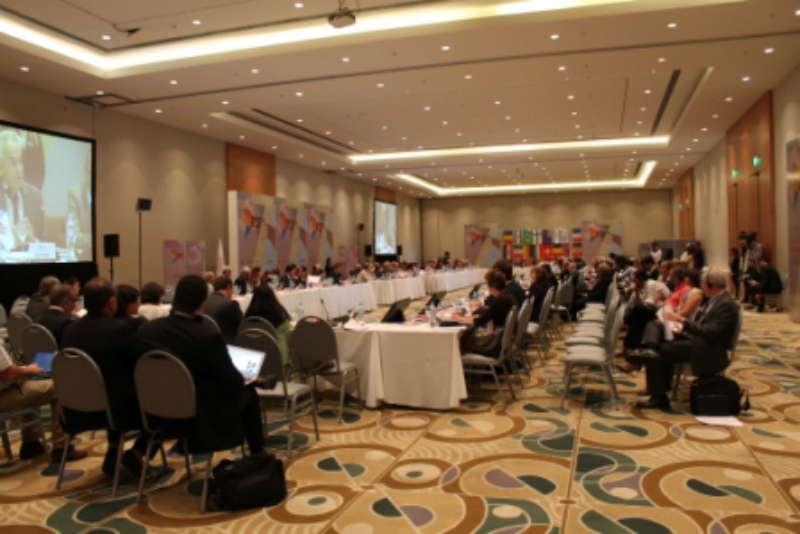
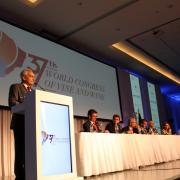
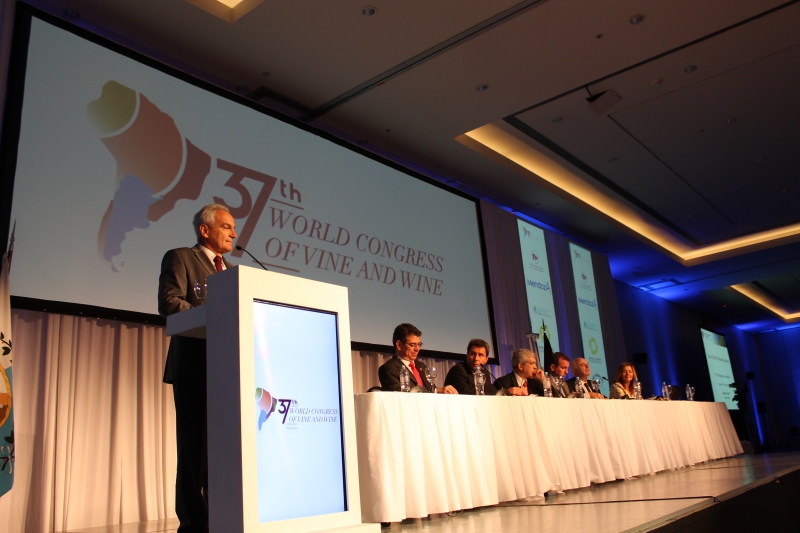
- 7519 mha is the worldwide area under vines in 2013
- Despite decrease in area under vine, the world production of grapes has been increasing (751 Mql) in 2013
- 271 Mhl is the first estimation for the wine produced in 2014
- Sparkling wine market has expanded in recent years: in 10 years production has increased by more than 40% and consumption by 30%.
OIV’s Focus on the Sparkling wine market